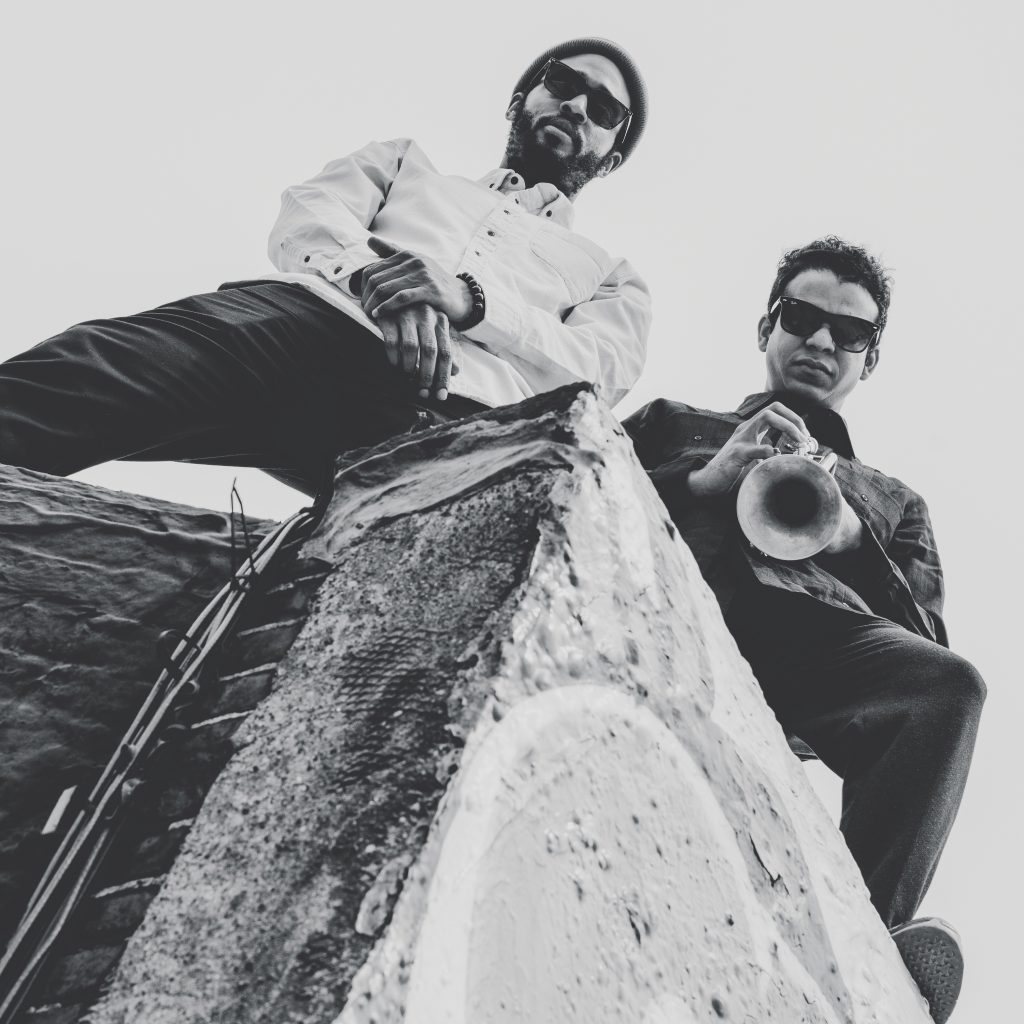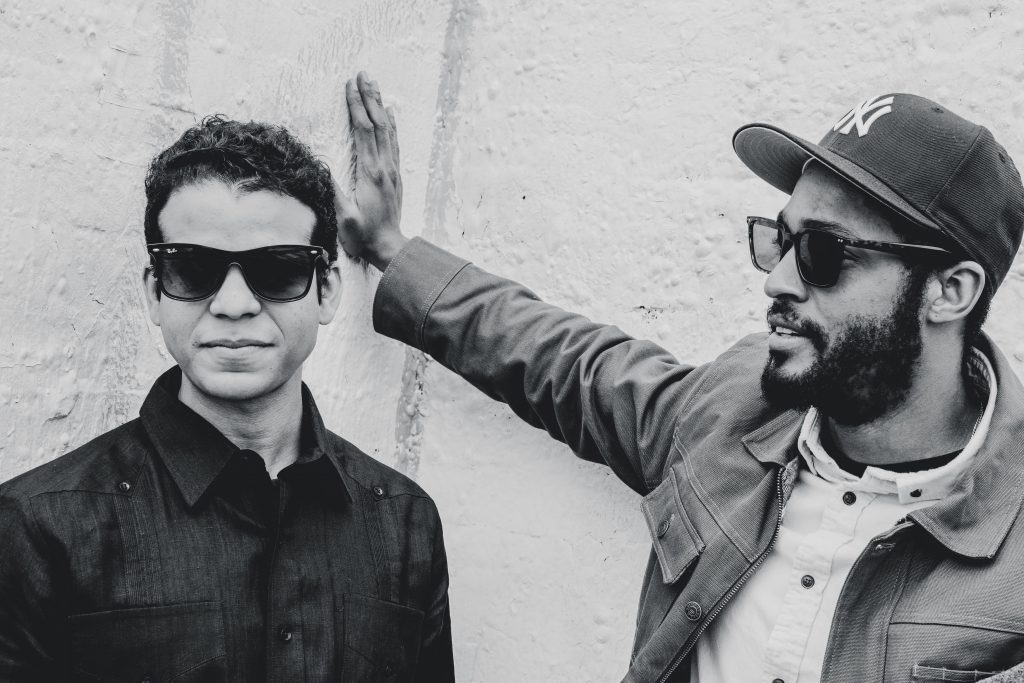Aquiles Navarro & Tcheser Holmes
Heritage of the Invisible II (International Anthem)
Contact Jacob Daneman about Aquiles Navarro & Tcheser Holmes
Afro-Caribbean improvisational trumpet-and-percussion duo, Aquiles Navarro & Tcheser Holmes, are longtime friends, collaborators, and devotees of New York City’s creative music scenes. Aquiles Navarro was born in Toronto during a time of great, political upheaval in his family’s native home of Panama. Dangers surrounding the reign of Manuel Noriega and the subsequent U.S. invasion of 1989 prompted the Navarro family’s exit, returning years later to Panama City in 1997. Navarro’s grandfather was an accomplished cellist and the customs of Latin folkloric music were fastened deeply to the family paradigm. Navarro went on to study with Panamanian trumpeter Victor “Vitin” Paz (Fania All-Stars) and Panamanian-American composer/saxophonist Carlos Garnett (who played and recorded with Miles Davis on numerous sessions, including 1972’s On the Corner, as well as Art Blakey’s Jazz Messengers, Andrew Hill, Charles Mingus, Gary Bartz, and Pharoah Sanders). In 2008, Navarro moved to Boston to continue his studies at the New England Conservatory (NEC) and, before the semester had even begun, a friendship had kindled between him and another incoming new student, Tcheser Holmes.
“The first few days, while moving into the dorms, I heard Tcheser play a rhythm on a friend’s metal bed frame and I thought, ‘Ah man, he’s got it,’” remembers Navarro. “From there on, we were always working on music, leading up to our first quartet tour in Panama right after graduation.” Given a djembe at the age of 4, Tcheser Holmes naturally wove into the fabric of a tight-knit Pan- African community in Brooklyn centered around the spiritual organization, Ausar Auset Society, and his family’s dance company, The Bennu Ausar Dancers. From early on, Holmes remembers “playing and viewing music purely as a source of celebration and achievement.” Since Holmes’ high school didn’t have a music program, he enrolled in the Manhattan School of Music’s Precollege for pre- conservatory training and eventually made his way toward NEC.
Holmes’ mother, Cecelia Adams-Holmes, was a consistent channel to him throughout his upbringing. A longtime arts educator, Adams-Holmes founded and continuously operates the cultural arts program at Kamit Preparatory Institute in Brooklyn, New York. His uncle, Ra Un Nefer Amen, a classically trained pianist from Panama, abandoned an established music career after migrating to Brooklyn in the 60s, instead focusing on the authorship of the Ausar Auset Society. “They’re definitely a force behind my music,” says Holmes. “My mom challenged me and made me take music seriously. And I always had a facility to go and practice.”
“In New York, I’ve been a working musician since day 1,” recalls Navarro. “Tcheser and I played all over the city, from Uptown to all over Brooklyn, often booking our own gigs.“ Dance clubs and subway platforms, The Bowery Poetry Club, the Latin Jazz Big Band at the Nuyorican Poet’s Café, and Roberto Roena y su Apollo Sound in the Bronx – the two musicians developed a wide creative range. “We got familiar with a system where the rhythm is quantified,” says Holmes. “But I feel like we always remained ‘children’ in terms of viewing music. Kobe said ‘Be a Kid.’ We never needed to validate the process.”
In September of 2014, Navarro and Holmes self-released an album of improvisations that they’d recorded in Panama earlier that summer. The following spring, they were invited to perform at The Silent Barn in Brooklyn, an event organized by Musicians Against Police Brutality as a benefit for the family of Akai Gurley (a Black man who was killed by a NYPD officer). The duo took the stage immediately before a formalizing performance by Camae Ayewa (aka Moor Mother), Keir Neuringer and Luke Stewart, a trio that would soon adopt the name Irreversible Entanglements, as well as Navarro and Holmes themselves.
Once incorporated, Navarro and Holmes fell in rapidly as collaborative partners to the now-five- piece Irreversible Entanglements. The group’s 2017 debut vaulted them forward, earning rankings on year-end lists by WIRE Magazine, Bandcamp, and NPR Music, and reaching growing audiences from prominent stages at the Pitchfork Music Festival in Chicago, Le Guess Who Festival in Utrecht, NL, the Barbican in London, and the Smithsonian in Washington, DC. In Spring 2019, Navarro and Holmes recorded their second album with Irreversible Entanglements, Who Sent You? (International Anthem/Don Giovanni 2020), which was released to high acclaim from The New Yorker, Stereogum, Pitchfork, Paste, and the oldest continuously published magazine in the United States, The Nation, where writer Marcus J. Moore said “Irreversible Entanglements’ fearless music takes to task the police, American politics, capitalism, and racism.”
In the Fall of 2019, Navarro and Holmes coalesced around the idea of composing new, expanded duet recordings, booking two after-hours sessions at Brooklyn’s S1 Studios. “Each tune has a compositional background to it, but improvisation and the telepathy between us remains the main catalyst,” notes Navarro. From this open map, the duo layered samples and electronic elements from Juno 106 and Moog Grandmother synths over their acoustic improvisations, overdubbed contributions from vocalist and instrumentalist friends, and added field recordings of themselves in conversation. To distill the mass of sounds, the duo contacted ada adhiyatma (aka Madam Data, a Philadelphia-based composer/electronicist who they’d met through a joint collaboration with Moor Mother) for a final mix. The resulting album – Heritage of the Invisible II – reveals Navarro and Holmes stepping firmly into the limelight of progressive music-making.
The tracks flash by in a rapturous onslaught to Holmes’ time-keeping, crystalizing in incantations by Spanish poet Miguel de la Fuentes (an apocalyptic fever dream on “Initial Meditation”), Argentinian/Cuban vocalist Brigitte Zozula (the bliss of bustling nightlife on “A Night in NY”), Navarro’s mentor and collaborator Carlos Garnett (the banality of economics on “$$$ /// billete”) and their own musings on friendship and community (the stoned soul picnic of “Plantains”). On the 8-minute duet “NAVARROHOLMES,” the two players reach a summit as they face off in spirited alliance, conjuring visions of legendary free jazz telepathics – Braxton and Roach, Coltrane and Ali, Cherry and Blackwell. Identifying as active listeners and audience members as well, Navarro and Holmes step back on “M.O.N.K (Most Only Never Knew)” to shine a light on the solo improvisation of pianist/composer Nick Sanders.
Navarro and Holmes never idle on Heritage of the Invisible II, choosing instead to ponder their origins in a devout charge of ecstatic cooperation. Meditating on the unseen constructive forces of culture, and rhythm as a cadence encoded in one’s heritage, with Heritage of the Invisible II they share a volume of their story in rich color – a brilliantly imagined testament to generations of memory, creation and existential joy.

